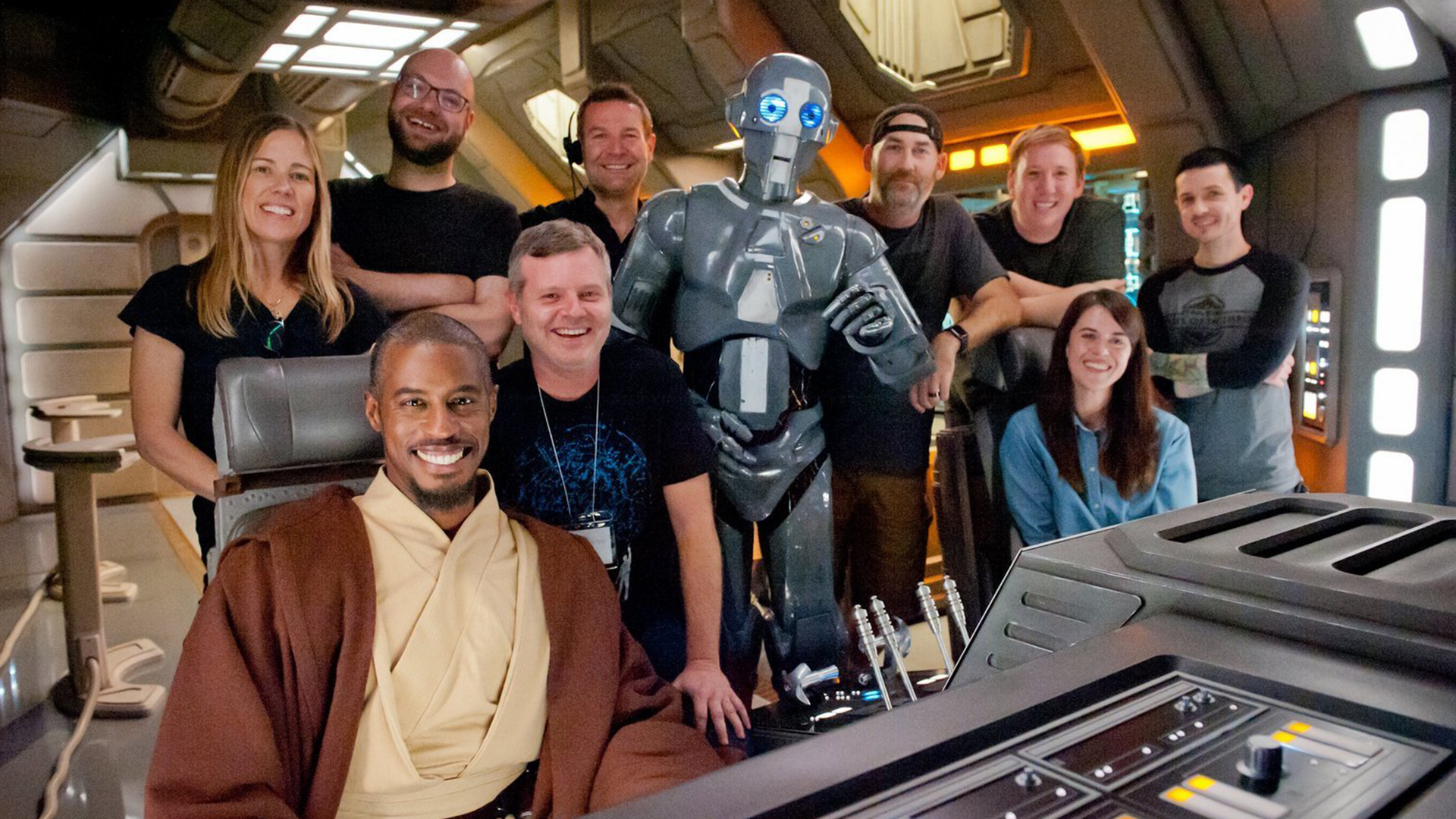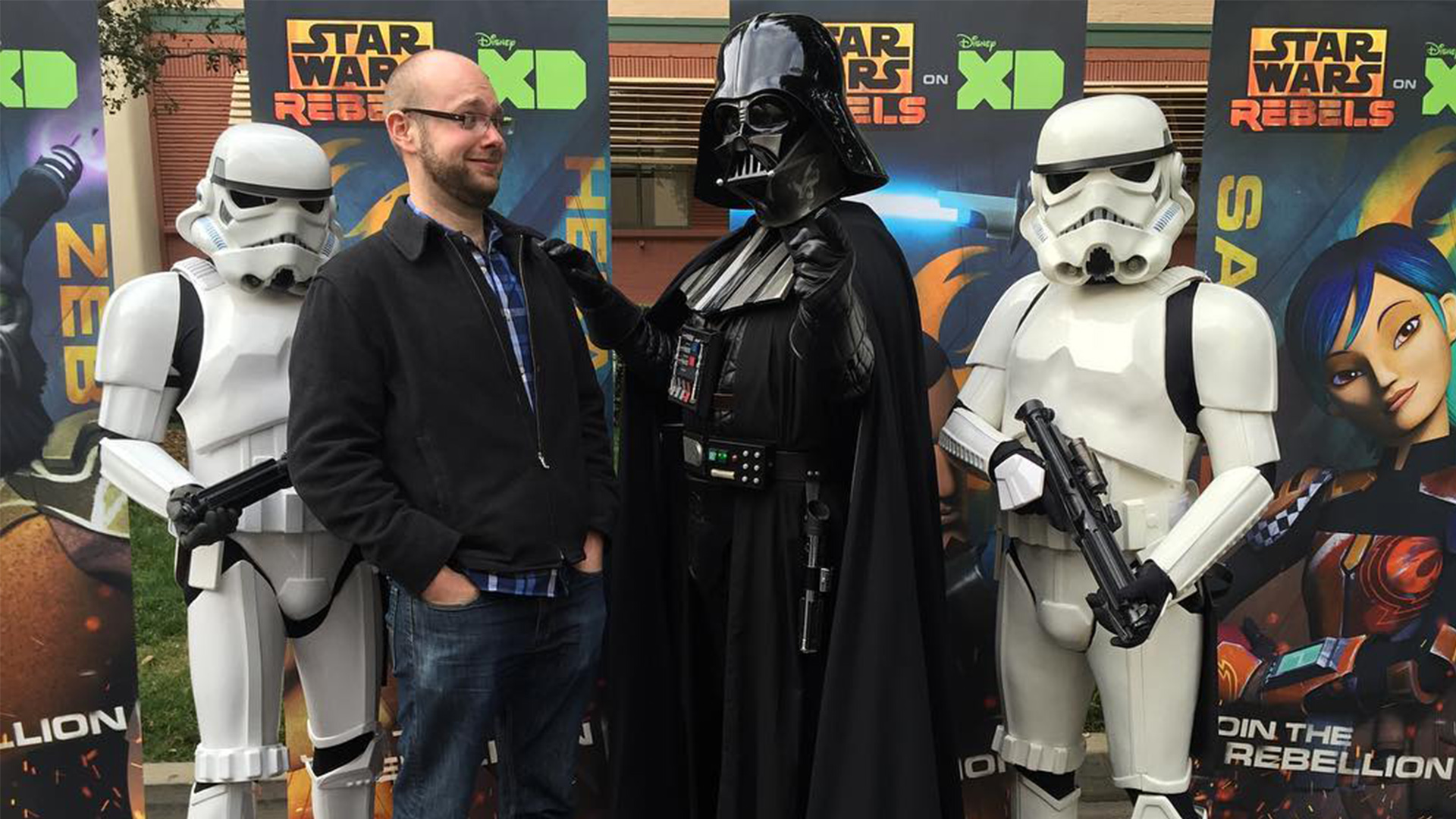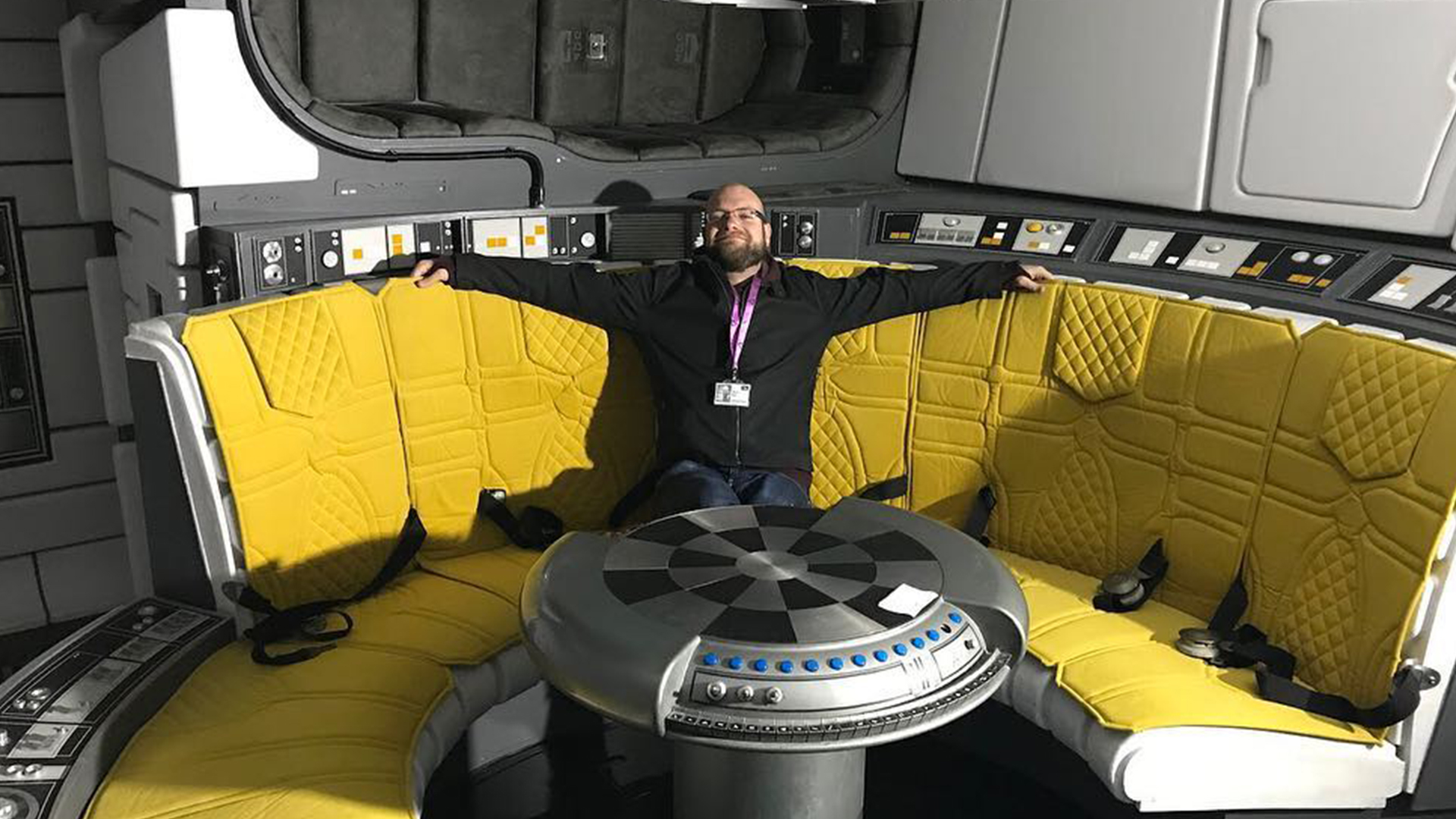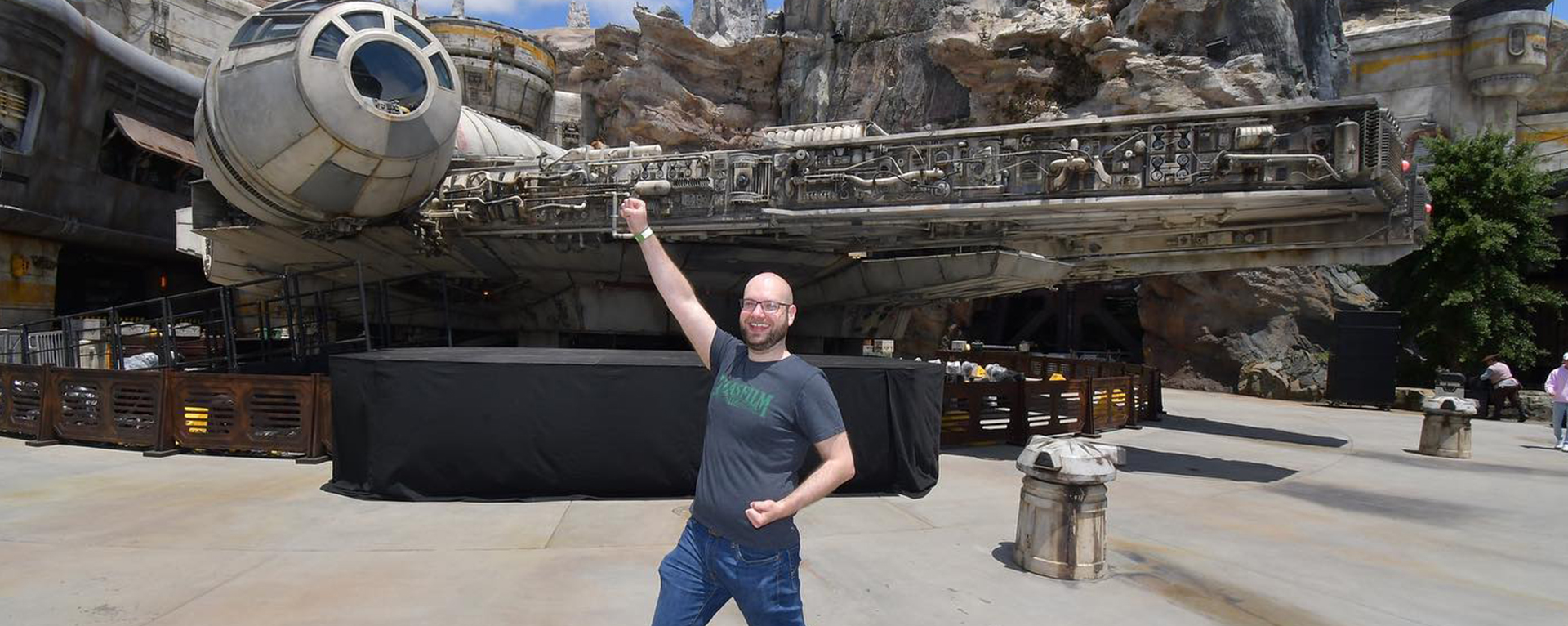Employee Spotlight: Steve Blank
Star Wars Stories Come in All Shapes and Sizes, And Steve Blank Helps Connect Them All Together
Can you tell us your role and summarize your day-to-day responsibilities?
I am the Director of Franchise Content and Strategy within the Lucasfilm Story Group. At the center of my job is my partnership with my boss, vice president James Waugh. Working closely with the live-action team and business leads, we oversee content strategy for our franchise platforms like video games, publishing, consumer products, parks & resorts, ILMxLAB, and more. We look at the breadth of our storytelling platforms and think about how we can line up all the different narratives to make a singular Star Wars creative statement at any given moment.
That encompasses many different areas of the company!
It does! In total though there are three core pillars to my day job. The franchise content strategy is just the first one. The second pillar is something I partner on with another creative executive, Lauren Olsen. We liaise with the live-action & animation development and production teams to stay on top of their creative work, and help codify and share that foundational creative information with our franchise partners. For example, we build narrative overviews, pitch kits, asset menus, and more to present creative information that drives support for that content across marketing, consumer products, and more.
The third pillar is more traditional creative development. Specifically, I help oversee our full video game slate for the franchise story team guiding the construction of both Star Wars and Indiana Jones. Naturally, I don’t do this alone, multiple members of the Story Group work with me in this space, and we interact every day with the great Producers and creative talent on the Lucasfilm Games team.
Could you discuss your professional background? Was there anything specific to your experience that prepared you to take on your job today?
I have a degree in film and media studies with a concentration in post-production, so for a long time I wanted to be an editor. That’s how I often thought about story construction, in the sense of taking different pieces and building it into a coherent story. After graduation though, I changed paths and found my way into marketing, at first in real estate as a temp role but ultimately making my way into entertainment. I worked at TV Land as a freelance Marketing Coordinator, and got to meet Betty White on her show Hot in Cleveland, a highlight of my career!
I then moved to Nickelodeon where I worked on lots of great shows (including Teenage Mutant Ninja Turtles and The Legend of Korra) and helped organize efforts for the entire network at San Diego and New York Comic-Con. It was in that role where I was exposed to the full pipeline of content creation, distribution, and support: how shows are made, how they get programmed, how you support them and bring them to events, and how you think about franchise extensions and consumer products.
After three years at Nickelodeon, I made the decision to move to San Francisco and worked briefly for Google as a Partner Brand Manager on Chrome OS. But after realizing that the tech industry wasn’t quite right for me, I was able to return to entertainment and find a new role at Lucasfilm in marketing before I ultimately joined the Story Group.
Can you share a little more about the context for when you joined Lucasfilm?
It was August of 2014, and I was hired as the Manager of Franchise Marketing while the person normally in that position was going out on maternity leave. We were two months out from launching the animated series Star Wars Rebels on Disney XD. It was very exciting because it was a chance for me to get back into entertainment and I felt that I had a lot of experience to fit the role.
And were you a fan of Star Wars and Lucasfilm?
Oh yes! I grew up with Star Wars. My parents loved the movies, so my older brother & I were introduced to them at a young age, we watched them so many times it wore out the VHS tapes. I also saw the 1997 Special Edition releases in theaters with my friends multiple times. And in 1999, my mom took me to the midnight opening of Star Wars: The Phantom Menace at the Kent Theater in Brooklyn. It was a tiny theater, and the only place we could get tickets. The deal with my mom was that I had to go to school the next day, so, despite being utterly exhausted I was the coolest kid in class on that Friday morning. Darth Maul also instantly became my favorite character, I was at the exact right age to think he was the coolest thing I’d ever seen. That still holds true to this day.
Funnily enough, my family had gone to Walt Disney World in the early 1990s when I was pretty young, and we had the chance to meet Chewbacca, and see cutouts of the Teenage Mutant Ninja Turtles, which were at Disney World at that time. In hindsight, it’s very amusing because I ended up working on TMNT when I was at Nickelodeon, and then later on Star Wars at Lucasfilm. So that one trip to Disney World ended up being a roadmap for my career!
Coming back to your early time at the company, can you tell us about your first impressions of Lucasfilm?
As odd as it may seem the first thing that comes to mind is the aesthetic of Letterman Digital Arts Center. The architecture with wood paneling and the artwork on the walls makes you feel like you’re stepping into a creative environment. There is all this great material that helps inspire us and remind us what we have the privilege to work on. This was a place to jive and talk about philosophies and creative perspectives.
Lucasfilm seems to be a great place for employees to move between departments. Could you discuss your transition to the Story Group?
On Rebels I had the opportunity to work closely with Carrie Beck, who co-created and produced the series, and we built a great relationship. I think she understood that I had a background in grasping the power of a franchise through its extensions in a fan-first and positive way: people enjoy the world-building and expanding on the storytelling, a toy is a lens that allows someone to play with their favorite character, visiting a convention is about interacting with other fans, etc. All of the work we were doing, even if it wasn’t creating the show itself, was important specifically because it means something to the fans.
Fortunately for me, Carrie was a member of the Story Group, which was continuing to grow, and she helped me get on the radar of the team. So not long before the end of my time on the marketing team, I met with Kiri Hart, who was then head of Story Group. Kiri & Carrie were looking for someone with a franchise background to join the team and be embedded in development, but with an eye on what could & should be shared with our franchise teams, and on what timeline. I was able to interview for that role and ultimately joined the team as a Creative Executive.
My first year was focused on building the process and infrastructure for this new role and creating the deliverables to support the launch of Star Wars: The Force Awakens and look forward to Rogue One and additional seasons of Rebels. Since then, I’ve been fortunate to grow in my role and be mentored by people on the team, such as former Story Group member Diana Williams, who saw potential in my creative development perspective and helped set me up to work on video games, which she had been overseeing previously. And also by James Waugh, who believed in my strategic thinking capabilities and provided me the chance to partner with him on our overall content strategy.
If you could share an example of a project that was significant for you in your growth and development, what would it be?
It’s hard to pick because it’s an embarrassment of riches, I’ve been incredibly fortunate with my many opportunities here. But since I’m being asked to choose, I’d have to land on two examples!
First, my initial experience as a key development lead was on the game Star Wars Battlefront II. I got to be in the room with the writers, I attended performance-capture shoots and met actors, I attended Star Wars Celebration and discussed the game on panels, and oh so much more. It was tremendous to be involved in that single-player campaign, it was my first time helping to create something, and I got to do it with veterans and pros from the incredible Lucasfilm Games team and EA’s Motive Studio.
A few years later, along with Scott Bromley, I had the chance to co-develop the idea for and co-executive produce Star Wars: Jedi Temple Challenge, a live-action game show on the Star Wars Kids YouTube channel. We also worked with our Lucasfilm colleagues and producers Mickey Capoferri, Christine Beebe, and Jacqui Lopez. It felt surreal the entire time we were making it. We got to work with Ahmed Best who played Jedi Master Kelleran Beq and Mary Holland who voiced our droid AD-3. There was also an amazing production team behind the scenes who helped us craft the challenges, design the sets, and so much more. Special shout-out to Killian Plunkett from Lucasfilm Animation who had a big hand in the gorgeous aesthetic of the show. As a co-EP I had the chance to really be involved in the entire process of creating and distributing a show for the first time, getting intimately familiar with all of the elements needed to make something, it was extraordinary. Lucasfilm truly afforded me the opportunity to have exponential growth with that experience.
It’s so endearing with Jedi Temple Challenge because that was a homegrown project.
It was! Scott Bromley and I had an affinity for certain kids programming that we’d grown up with, specifically physical-challenge shows like Legends of the Hidden Temple, GUTS, and more. I’d worked at Nickelodeon where a lot of those shows had originated in years past, so they held an even more special place in my heart. To be able to create an homage to them inside the Star Wars galaxy was an extremely surreal dream come true. Lucasfilm really let us explore and supported us in doing so, and being able to work on it with Mickey, Christine, Jacqui, and so many members of the Online team was just a blast.
Coming back to your role in general, are there are any skills or attributes that are important to your job but may be surprising to those unfamiliar with it?
The world “diplomacy” comes to mind. As someone who helps shepherd creative information from once space to another, there are many questions people have, and there’s a lot of nuance as to how things are executed. One has to clearly articulate their own perspective and then listen to other people’s needs. One has to understand where everyone else is coming from so that you can find the best answers to different questions. That’s critical for narrative development too, especially when giving tricky notes or trying to pivot an idea. You have to understand how to engage, share information, and ask for changes in a tactful and diplomatic way.
In addition to your multi-faceted role, you’re also the co-lead of the LGBTQ+ employee resource group, Lucas Pride. Could you discuss your involvement in that group and how it broadens your experience with the company?
As a gay man it was important to me personally to be more visible with my queer identity within the company. I wanted to be aware of not inadvertently closeting myself, I wanted my personal identity to be a meaningful part of the conversation around who Steve is at Lucasfilm. In a director role I’m in a position to influence some of the content made across Lucasfilm, so I felt it was necessary to also be present for our LGBTQ+ employees as someone who they could have conversations with about authentic representation, having more LGBTQ+ characters, etc. Being able to engage in those conversations with our employees in turn allows me to be able to share their questions, concerns, and perspectives in the higher-level rooms I have access to. I have a strong opportunity to be a different voice in the room when the company is looking for diverse points of view and that is also of the utmost importance to me.
Do you have a favorite memory of any of the trips you’ve made for work? Perhaps a moment at Celebration or visiting the set of a production?
This is another “embarrassment of riches” moment for me. I’ve been afforded some great opportunities to travel all over the world for work and each trip has its own stand-out memory. But I would likely say my favorite moment would have to be my trip to London in July 2016 for Star Wars Celebration. It was already great to be in another country for Celebration, but I was also able to take advantage of our relative proximity to Pinewood Studios and travel out there. Rayne Roberts and I went together and we saw some pick-up shots for Rogue One and some of the final days of shooting on The Last Jedi. Specific to that film, Rian Johnson invited us to set, introduced us to Daisy Ridley, talked to me for a few minutes about Brick (my favorite film of his, at least at the time), and took photos of me in the cockpit of the Millennium Falcon on his iPhone. It was one of the most surreal experiences of my life!
Do you have a favorite Lucasfilm movie or production, and if so, why?
Star Wars: The Empire Strikes Back. Perhaps I’m not too original in my adoration for the film, but it left an indelible impression on me as a young kid. There are too many classic moments to count, but for whatever reason the three that left a lasting impression on me are:
- The tauntaun’s guts! It was such a visceral moment. You could almost feel the extreme cold of Hoth juxtaposed against the fiery warmth of the creature’s insides. It was so grotesque and icky and weird. Little me just loved it.
- Escaping the Exogorth. This moment was my first real introduction to giant creatures. The sense of scale of the Exogorth blew my mind as a youngin’ and I genuinely think it ignited an appreciation of and fascination with creatures of enormous size – kaiju, Cthulhu, and the like.
- “No, I am your father.” I think this broke my brain as a child. Legitimately, little Steve could not process what he was seeing or hearing. Luke’s raw emotion behind “no” and “that’s impossible” were so entirely relatable because it’s what everyone in the audience was feeling. But it also spoke to the heart of what makes Star Wars so powerful – these mythic and fantastical elements all grounded in a relatable emotional core, with family at its heart.
What advice would you give to those aspiring to join Lucasfilm?
You know, this one is actually a little bit tricky to answer! And I think that’s because, as blithely cliché as this sounds, everyone has a unique path. There’s not a strict rigidity to the advice I’d give because it yearns to be bespoke to each individual. I suppose what I would say is to think about what’s important to you, if you want to work at Lucasfilm, why is that? Are you passionate about good storytelling? Are you a fan of space opera or fantasy in general? Do you love the design aesthetic of things like Star Wars or Indiana Jones? Find that little light within yourself and focus on it, try to define it, then do some research on people with a similar “light” and learn about their paths, try to identify the types of jobs they have, and then put in some work to build the skill sets relevant to that field. Being able to show up with not just the skills needed for the role but also the ability to clearly articulate why you’re passionate about Lucasfilm will always stand out!




